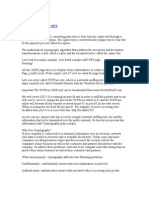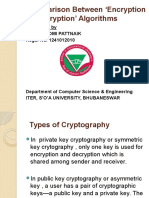0 ratings0% found this document useful (0 votes)
3 viewsASWIN TS Cryptographic Algorithm Notes Unit 2 Distributive System Security Notes
Distributed systems
Uploaded by
tejeswarkomaraCopyright
© © All Rights Reserved
Available Formats
Download as PDF or read online on Scribd
0 ratings0% found this document useful (0 votes)
3 viewsASWIN TS Cryptographic Algorithm Notes Unit 2 Distributive System Security Notes
Distributed systems
Uploaded by
tejeswarkomaraCopyright
© © All Rights Reserved
Available Formats
Download as PDF or read online on Scribd
You are on page 1/ 3
Cryptographic Algorithms
A cryptographic algorithm is a set of steps that can be used to convert plain text into cipher
text. A cryptographic algorithm is also known as an encryption algorithm.
A cryptographic algorithm uses an encryption key to hide the information and convert it into
an unreadable format. Similarly, a decryption key can be used to convert it back into plain-
readable text.
Plain Text Cipher Text
Encryption Decryption
Cipher Text Plain Text
Process of Cryptography
Types of Cryptographic Algorithms
To protect sensitive data and conversations, cryptography uses complex algorithms. These
mathematical formulas enable the encryption, decryption, signature, and verification
processes that protect secret data during transmission and storage.
Major types of eryptographic algorithms
1, Advanced Encryption Standard (AES)
AES (Advanced Encryption Standard) is a popular encryption algorithm which uses the same
key for encryption and decryption It is a symmetric block cipher algorithm with block size
of 128 bits, 192 bits or 256 bits. AES algorithm is widely regarded as the replacement of DES
(Data encryption standard) algorithm, which we will learn more about later in this article.
There are many types of AES depending on the rounds:
+ AES-128 uses 10 rounds
+ AES-192 uses 12 rounds
+ AES-256 uses 14 rounds
more rounds there are, the safer the encryption. This is why AES-256 is considei
st encryption.
‘Characteristics of AES Algorithm
‘+ Versatile: I is versatile because it ean be used for both hardware and software
‘+ Wide applications: Widely adopted in various applications, including:Google Cloud,
Facebook and Password managers
2. Data Encryption Standard (DES)
DES is an older encryption algorithm that is used to convert 64-bit plaintext data into 48-bit
encrypted ciphertext, It uses symmetric keys (which means same key for encryption and
decryption). Itis kind of old by today's standard but can be used as a basi building block for
learning newer encryption algorithms.
Characteristics of DES
+ Same symmetric key: DES uses symmetric-key algorithm and therefore, encryption
and decryption can be done by single key using same algorithm,
‘+ Easier Implementation: DES was designed for hardwares rather than software and
shows efficiency and fast implementation in hardwares.
fF technique: Transposition and substitution cipher is used: This algorithm uses
cipher and substitution cipher technique
technique acts as a building block for other cryptographic
3. RSAAlgorithm (Rivest, Shamir, Adleman Algorithm)
So, RSA is an basic asymmetric cryptographic algorithm which uses two different keys for
‘encryption, The RSA algorithm works on a block cipher concept that converts pl
cipher text and vice versa
RSA algorithm is an asymmetric cryptography algorithm. Asymmetric actually a
works on two different keys ic. Public Key and Private Key. As the name describes that the
Public Key is given to everyone and the Private key is kept private,
CCharacteristies of RSA Algorithm
‘+ Security: Many consider the RSA method to be highly secure and widely used for
transmitting data
Fast Speed: The RSA approach is known for its speed. Can be implemented swifly
hen cryptography needs aise
rent keys: In the RSA technique two separate keys are uilized for encrypting and
{decrypting data. The public key is used to encrypt the information while the private key
is employed for decryption.
‘+ Key exchange: With the RSA method secure exchange can be achieved, enabling two
parties to swap a key without transmitting it over the network
Encypton Decrpton
4. Secure Hash Algorithm (SHA)
SHA is used to generate unique fixed-length digital fingerprints of input data known as
hhashes. SHA variations such as SHA-2 and SHA-3 are commonly used to ensure data
integrity and authenticity. The tiniest change in input data drastically modifies the hash
‘output, indicating a loss of integrity. Hashing is the process of storing key value pairs with
the help of a hash function into a hash table,
CCharacteristies of Secure Hash Algorithm (SHA)
Security: The SHA 256 is highly recognized for its robust security features, among
hashing algorithms. It effectively prevents collision attacks ensuring that different inputs
do not produce the hash value, Websites prioritize user privacy by storing passwords in a
format
+ One-way hashing: Using SHA algorithms for one way hashing enables the storage of
information like passwords. Data hashing into a fixed length output simplifies indexing
and comparisons. Even a minor change in the message results ina hash when using SHA
algorithms facilitating the identification of corrupted data
‘+ Avalanche effect: A small change in the input value, even a single bit, completely
changes the resultant hash value. This is called the
+ Variable input length and fixed output length: SHA algorithm consits of a variable
input length (meaning the length of input is dynamic) and a fixed output length
You might also like
- Cryptography Data Encryption: Bhaskar Kakulavarapu ISACA-Detroit ChapterNo ratings yetCryptography Data Encryption: Bhaskar Kakulavarapu ISACA-Detroit Chapter33 pages
- Cryptography and Cryptographic AlgorithmsNo ratings yetCryptography and Cryptographic Algorithms36 pages
- Network Security & Cryptography - Unit-1No ratings yetNetwork Security & Cryptography - Unit-111 pages
- Need of Cryptography Types of Attacks Techniques of Cryptography Encryption AlgorithmNo ratings yetNeed of Cryptography Types of Attacks Techniques of Cryptography Encryption Algorithm31 pages
- A Comparison Between Encryption and Decryption'No ratings yetA Comparison Between Encryption and Decryption'15 pages
- Cryptographypptslideshare 130224053459 Phpapp01 PDFNo ratings yetCryptographypptslideshare 130224053459 Phpapp01 PDF11 pages
- Wepik Securing Data a Comprehensive Overview of Encryption Algorithms Including Des Rsa and Aes 20231006022247RepZNo ratings yetWepik Securing Data a Comprehensive Overview of Encryption Algorithms Including Des Rsa and Aes 20231006022247RepZ12 pages
- Brief Related to Cipher Encryption and DecryptionNo ratings yetBrief Related to Cipher Encryption and Decryption3 pages
- Cryptography - Notes For CISSP: by Keith Turpin - June 2005No ratings yetCryptography - Notes For CISSP: by Keith Turpin - June 20057 pages
- SWE 681 / ISA 681 Secure Software Design & Programming: Lecture 7: CryptographyNo ratings yetSWE 681 / ISA 681 Secure Software Design & Programming: Lecture 7: Cryptography90 pages
- Comparative Study of Different Cryptographic Algorithms For Data Security in Cloud ComputingNo ratings yetComparative Study of Different Cryptographic Algorithms For Data Security in Cloud Computing7 pages
- Computer Security: Principles and PracticeNo ratings yetComputer Security: Principles and Practice25 pages
- Understanding Encryption and Its Role in CybersecurityNo ratings yetUnderstanding Encryption and Its Role in Cybersecurity5 pages
- Topic 2 Highlights - Cryptographic ToolsNo ratings yetTopic 2 Highlights - Cryptographic Tools5 pages
- Encrption: Keywords: Encryption, DES, Blowfish, RSA, AESNo ratings yetEncrption: Keywords: Encryption, DES, Blowfish, RSA, AES10 pages
- RSA Algorithm_ Secure Your Data with Public-Key EncryptionNo ratings yetRSA Algorithm_ Secure Your Data with Public-Key Encryption11 pages
- The Role of Cryptography in Secure Data TransmissionNo ratings yetThe Role of Cryptography in Secure Data Transmission21 pages
- Module 16 Lesson 2 - Data Protection and Recovery IINo ratings yetModule 16 Lesson 2 - Data Protection and Recovery II73 pages

























































